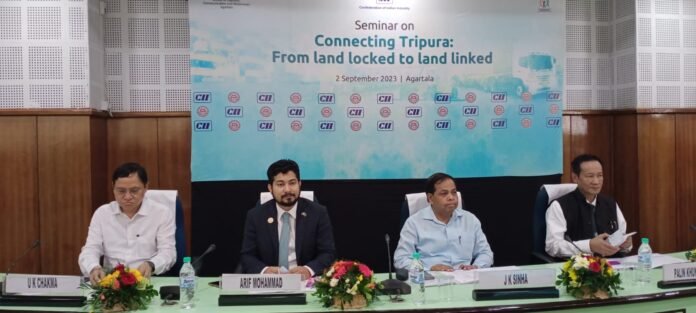Nestled in the northeastern corner of India, Tripura was once a landlocked state, geographically isolated from the rest of the country. However, recent developments in multi-modal connectivity have transformed it into a vital communication hub, propelling local traders into the realm of international commerce. The seminar titled “Tripura-Landlocked to Land-Linked,” held at Prajna Bhawan, Agartala, highlighted the significance of this transformation. Co-organized by the School of Logistics, Communication, and Waterways and the Confederation of Indian Industry (CII), this event brought together experts, scholars, and stakeholders from Tripura University, MBB University, ICFAI University, as well as central and state government bodies and business enterprises.
Inauguration and Keynote Addresses:
The seminar commenced with an inauguration by Chief Secretary of the State Government, JK Sinha, IAS, and the presence of Special Guest, Assistant High Commissioner of Bangladesh in Agartala, Arif Mohammad. Dr. Palin Khudongbam, Co-Chairman CII, North East Council, delivered the welcome address, shedding light on Tripura’s strategic geo-centric position to emerge as a multi-modal connectivity hub.
Secretary of the Department of Transport, Uttam Kumar Chakma, offered a comprehensive overview of the state’s communication system. He underscored the significance of Tripura’s internet gateway under the Act East Policy, emphasizing its position as the third in the country. Chakma also highlighted the expansion of rail infrastructure with the construction of rail yards in Nischintapur and Sabrum, along with the declaration of Udaipur, Dharmanagar, and Kumarghat railway stations as Amrit Bharat stations, promising advanced facilities. Furthermore, he announced SpiceJet’s approval to operate the Agartala-Chittagong route, progress on the Sonamura-Daudkandi waterway, and ongoing efforts to develop national highways.
In his inaugural speech, JK Sinha lauded the incredible changes in Tripura’s communication system in recent years, citing the development of broad-gauge rail lines and imminent electrified lines. Sinha emphasized that this advanced communication infrastructure would not only enhance connectivity but also narrow the communication gap at both physical and mental levels. He highlighted the proactive policies driving further improvements, foreseeing an acceleration of the state’s economic growth.
Sinha also emphasized the need for continued improvements in regional communication systems and increased financial activity. He advocated the efficient utilization of Tripura’s limited resources for the benefit of all stakeholders.
Assistant High Commissioner Arif Mohammad reiterated the importance of enhancing regional cooperation, considering the 52-year-old relationship between India and Bangladesh. He emphasized regional collaboration at political, commercial, and cultural levels, noting that Tripura’s strategic geographical location endowed it with immense potential to become a commercial hub. Arif Mohammad also underscored the importance of resource sharing, particularly in infrastructure development and river-related issues, to maintain regional peace and stability.
Technical Sessions:
Following the inaugural session, two technical sessions delved deeper into the seminar’s themes:
- Connectivity Tripura: The Next Gateway to the North-East: This session explored the multifaceted aspects of Tripura’s role as a burgeoning gateway to the northeastern region. Experts discussed the ongoing projects and future prospects that will further integrate Tripura into the northeastern economic landscape. The session highlighted the potential for enhanced trade, tourism, and cultural exchanges with neighboring states and countries.
- Tripura — The Trade Corridor: The second technical session focused on Tripura’s emerging status as a trade corridor. Experts and stakeholders examined the various economic activities, investments, and business opportunities that have emerged as a result of improved connectivity. They also discussed strategies to capitalize on these opportunities while ensuring sustainable growth and equitable distribution of benefits.
The seminar “Tripura-Landlocked to Land-Linked” underscored the pivotal role that Tripura is poised to play in regional connectivity and economic development. The state’s transformation from a landlocked entity to a land-linked communication hub is a testament to the concerted efforts of various stakeholders, including government bodies, educational institutions, and business enterprises. With a focus on peaceful cooperation and productivity enhancement, Tripura is well on its way to realizing its potential as a vital economic and trade corridor in the northeastern region.
As the state continues to invest in infrastructure, expand its transportation networks, and foster collaboration with neighboring regions and countries, Tripura’s journey from isolation to integration serves as a compelling example of how strategic planning and proactive policies can lead to transformative change. The path ahead is one of promise and potential, with Tripura poised to emerge as a beacon of progress in India’s northeastern landscape.


